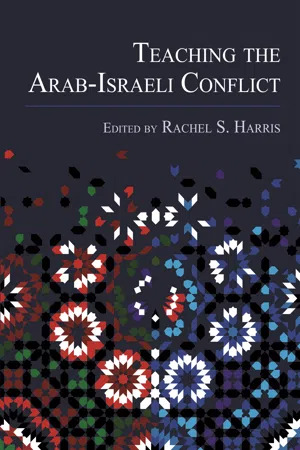
- 434 pages
- English
- ePUB (mobile friendly)
- Available on iOS & Android
Teaching the Arab-Israeli Conflict
About this book
The Arab-Israeli conflict has become a touchstone of international politics and a flash point on college campuses. And yet, how do faculty teach such a contentious topic in class? Taught not only in international relations, peace and conflict resolution, politics and history, and Israel and Middle Eastern studies courses but also in literature, sociology, urban planning, law, cinema, fine art, and business—the subject guarantees wide interest among students. Faculty are challenged to deal with the subject's complexity and the sensitive dynamics it creates. The result is anxiety as they approach the task and a need for guidance. Teaching the Arab-Israeli Conflict edited by Rachel S. Harris is the first book designed to meet this need. Teaching the Arab-Israeli Conflict brings together thirty-nine essays from experienced educators who reflect on the challenges of engaging students in college classrooms. Divided into seven sections, these personal essays cover a broad range of institutional and geographical settings, as well as a wide number of academic disciplines. Some of the topics include using graphic novels and memoirs to wrestle with the complexities of Israel/Palestine, the perils of misreading in the creative writing classroom as border crossing, teaching competing narratives through film, using food to teach the Arab-Israeli conflict, and teaching the subject in the community college classroom. Each essay includes suggestions for class activities, resources, and approaches to effective teaching. Whether planning a new course or searching for new teaching ideas, this collection is an indispensable compendium for anyone teaching the Arab-Israeli conflict.
Frequently asked questions
- Essential is ideal for learners and professionals who enjoy exploring a wide range of subjects. Access the Essential Library with 800,000+ trusted titles and best-sellers across business, personal growth, and the humanities. Includes unlimited reading time and Standard Read Aloud voice.
- Complete: Perfect for advanced learners and researchers needing full, unrestricted access. Unlock 1.4M+ books across hundreds of subjects, including academic and specialized titles. The Complete Plan also includes advanced features like Premium Read Aloud and Research Assistant.
Please note we cannot support devices running on iOS 13 and Android 7 or earlier. Learn more about using the app.
Information
Index
Table of contents
- Cover
- Title Page
- Copyright Page
- Dedication
- Contents
- Preface
- Acknowledgments
- Maps
- Introduction to the History of the Region and the Conflict
- Teaching Skills, Facing Challenges: What Happens in the Classroom?
- Empathy, Access, Language, and Education: Learning to See the Other
- Competing Interpretations and Multiple Narratives: Teaching Diversity
- History, Politics, and Religion: Putting the Class(room) in Context
- The Personal and the Political: When the Outside World Intrudes on the Sacred Class Space
- Thinking Differently and Creating New Paradigms: Teaching Israel/Palestine without Repeating History
- Conclusion: How What We Teach Changes (and Changes Us)
- Selected Bibliography
- Annotated Filmography
- List of Contributors
- Index